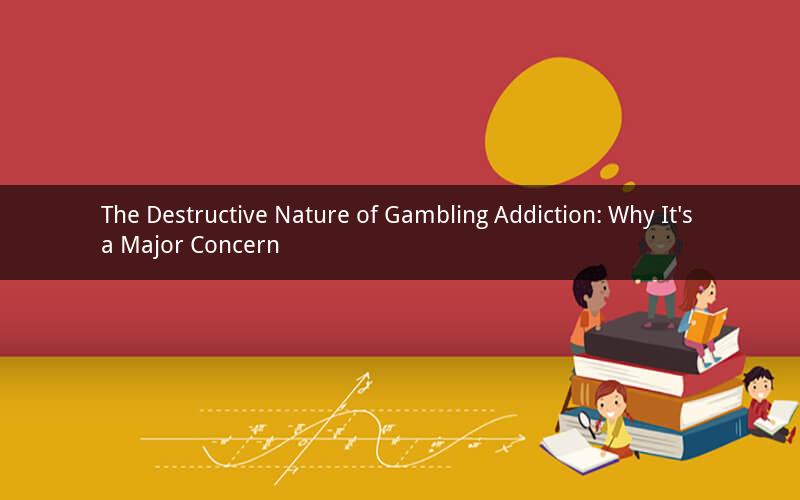
Gambling addiction, often referred to as ludomania, is a condition where an individual develops an uncontrollable urge to engage in gambling activities. This addiction can lead to a wide range of negative consequences, both for the individual and their loved ones. In this article, we will delve into the reasons why gambling addiction is considered to be a major concern.
1. Financial Ruin
One of the most immediate and severe consequences of gambling addiction is financial ruin. Individuals who are addicted to gambling often spend large sums of money on betting, which can lead to the depletion of their savings, credit card debt, and even the sale of valuable possessions. This financial strain can also extend to the addiction's victims, such as family members and friends, who may be forced to bear the burden of the individual's debts.
2. Emotional and Psychological Damage
Gambling addiction can have a profound impact on an individual's emotional and psychological well-being. The constant pursuit of winning and the fear of losing can lead to anxiety, depression, and other mental health issues. Additionally, the secrecy and deceit often associated with gambling addiction can strain relationships and lead to feelings of guilt, shame, and isolation.
3. Relationship Breakdowns
Gambling addiction can cause significant damage to personal relationships. The individual's preoccupation with gambling can lead to neglect of their family, friends, and other important responsibilities. This neglect can result in strained relationships, infidelity, and even divorce. Moreover, the financial strain caused by the addiction can exacerbate these relationship issues, making it even more challenging for the individual to maintain healthy connections.
4. Legal and Social Consequences
Gambling addiction can also lead to legal and social consequences. Individuals who are unable to control their gambling habits may engage in illegal activities to fund their addiction, such as theft, fraud, or embezzlement. Additionally, the social stigma associated with gambling addiction can lead to isolation, discrimination, and a loss of social status.
5. Health Risks
Gambling addiction can also pose significant health risks. The stress and anxiety associated with the addiction can lead to physical symptoms, such as headaches, stomachaches, and insomnia. Furthermore, the financial strain caused by the addiction can lead to a decrease in the individual's quality of life, which can, in turn, increase the risk of developing chronic health conditions.
How can gambling addiction be identified?
Gambling addiction can be identified by several key signs and symptoms. These include:
- Preoccupation with gambling, which can lead to neglect of other responsibilities
- Needing to bet more money to achieve the same thrill
- Feelings of guilt, remorse, or shame after gambling
- Trying to stop or cut back on gambling without success
- Continuing to gamble despite negative consequences
What are some of the most common treatments for gambling addiction?
There are several treatments available for gambling addiction, including:
- Cognitive-behavioral therapy (CBT), which helps individuals identify and change negative thought patterns
- Medication, such as selective serotonin reuptake inhibitors (SSRIs), which can help manage symptoms of depression and anxiety
- Support groups, such as Gamblers Anonymous, which provide a community of individuals who are struggling with similar issues
How can loved ones support someone struggling with gambling addiction?
Loved ones can support someone struggling with gambling addiction by:
- Educating themselves about the addiction
- Encouraging the individual to seek help
- Offering empathy and understanding
- Setting boundaries to protect themselves from the addiction's negative consequences
- Seeking support for themselves, as the addiction can also take a toll on their well-being
What are some of the long-term effects of gambling addiction on the individual?
The long-term effects of gambling addiction on the individual can be devastating. These include:
- Financial ruin, which can lead to a lifetime of debt and poverty
- Emotional and psychological damage, which can result in chronic mental health issues
- Relationship breakdowns, which can lead to isolation and loneliness
- Legal and social consequences, which can further exacerbate the individual's problems
- Health risks, which can lead to a shortened lifespan and decreased quality of life
In conclusion, gambling addiction is a major concern due to its wide range of negative consequences. From financial ruin and emotional damage to relationship breakdowns and health risks, the impact of gambling addiction can be devastating. It is essential for individuals struggling with this addiction to seek help, and for loved ones to support them in their journey towards recovery. By understanding the dangers of gambling addiction, we can work together to create a healthier, more productive future for all.